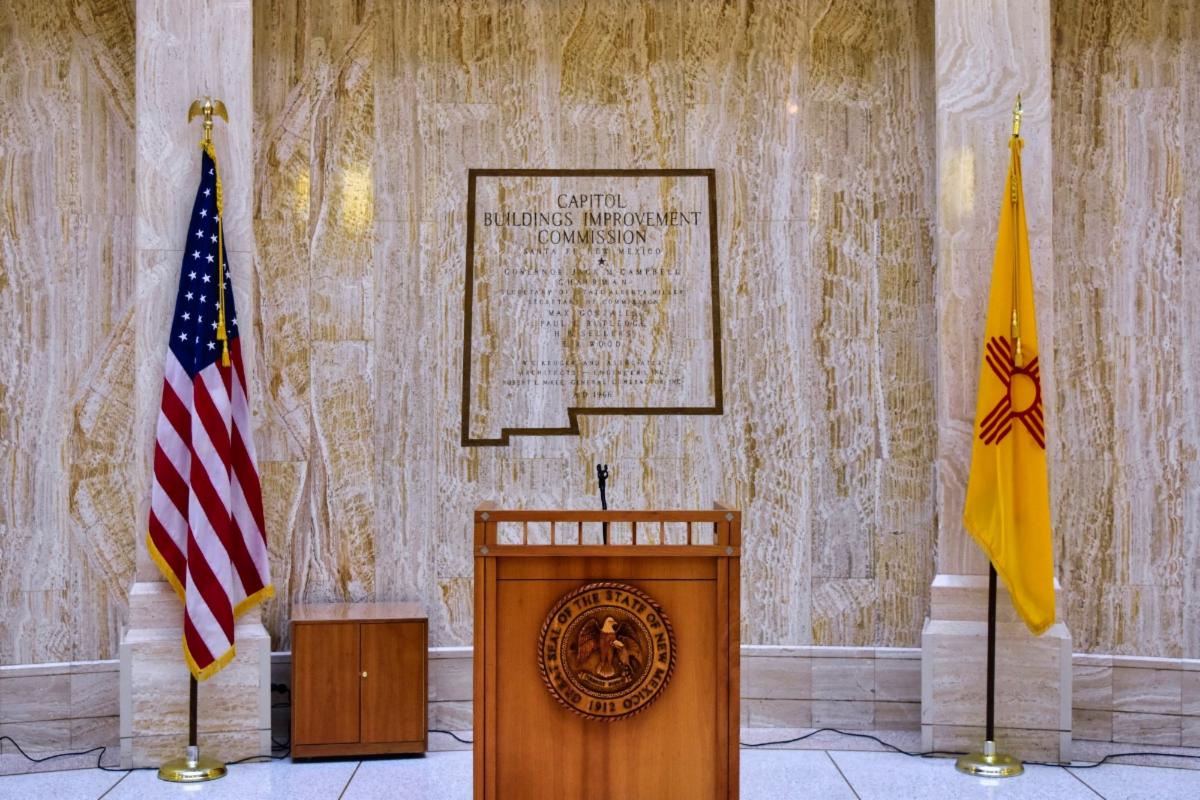$340 MILLION WORTH OF GREEN PROJECTS – GOOD VALUE or QUESTIONABLE RESULTS?

Senate President Pro Tempore Mimi Stewart (D-Bernalillo) is carrying a package of bills – Senate Bill 4, SB 48 and SB 49 – aimed at further reducing greenhouse gas emissions. We’ve recently written on what we perceive to be the economic risks of SB 4, which sets a goal of zero emissions by 2050 (as compared to what emissions were in 2005). Today, the Senate Conservation Committee gave do-pass recommendations to SB 48 and 49, which seek to appropriate $340 each year for community projects aimed at greenhouse gas emission reductions. The vote was a straight partisan vote 5-3, D’s in favor, R’s opposed.
Terri Cole, President and CEO of the Greater Albuquerque Chamber of Commerce, offered these observations:
“I appear today in opposition to SB 48 and 49. Where do I begin?
“First, the bills are so broadly drafted that it seems like a rudderless ship adrift. The number of project categories seem likely to allow almost anything to fit. Is that what the Legislature wants to do? Spend $340 million on projects that may or may not contribute anything to the goal?
“Second, as a consequence, the bill has no measurables, no way to know what the outcomes are and whether the taxpayers got their money’s worth. These projects should have to go through the same rigorous examination and oversight as GRO projects.
“Finally, this bill comes with that $340 million price tag every year. This isn’t a one-shot deal. With all due respect to the sponsor, this bill doesn’t strike us as being anywhere near fully baked. This is a prime candidate for interim study. Thank you, and please vote no on SB 48.”
Stewart defended her bill by saying she has identified $1 billion in projects that communities have asked for but for which no money has been appropriated. Her idea is to have communities and organizations apply for grants to build these projects, which are far ranging, including electric grid modernization, green energy projects, training, electric vehicle infrastructure, recycling – in total 11 broad categories.
Committee members Sens. Larry Scott (R-Chaves, Eddy & Lea), Candy Ezzell (R-Chaves & Eddy) and Jim Townsend (R-Eddy & Otero) voiced skepticism about the projects being able to contribute much to the overall reduction in greenhouse gases. Being from the oil-producing part of the state, they also voiced concern about the negative impacts on oil and gas and, therefore, loss of revenue to state and local governments. Townsend voiced the concern the jobs created through this legislation would be minimal and couldn’t pay for the cost of the programs.
The bill was supported by the Governor’s Office and several environmental organizations. In addition to the Chamber, the Gallup/McKinley Chamber, the Independent Petroleum Producers Association, the New Mexico Oil and Gas Association and the New Mexico Business Coalition stood in opposition. The bill now moves to the Senate Finance Committee.
PREVAILING WAGE IMPOSED ON PRIVATE PROJECTS

House Bill 6, sponsored by House Majority Leader Reena Szczspanski (D-Santa Fe), seeks to impose prevailing wage rates on Industrial Revenue Bond projects even though they are privately funded. In New Mexico, prevailing wage rates apply only to publicly funded projects. The House Government and Elections Committee approved the bill on a 6-1 vote, sending it to the House floor.
So, are IRB projects public projects or not? That’s the central question. Proponents say they are because the projects are built for a public purpose and end up belonging to a government entity. Opponents say that the money used for the projects is private capital and, therefore, not public funding.
Terri Cole, President and CEO of the Greater Albuquerque Chamber of Commerce, weighed in in opposition, saying:
“The Chamber opposes HB 6 because it will make New Mexico less competitive in attracting private investment for industrial development. We all know that New Mexico already has trouble attracting capital, so we shouldn’t make the problem worse. We also know that raising the price of anything generally results in getting less of that thing – it’s among the basic laws of economics. Increasing the cost of industrial revenue bonds will not defy that basic law.
“States around us don’t put this kind of additional cost burden on their industrial revenue bonds. Developers are consumers like the rest of us – if they can get the same thing for a lower cost, they’ll shop there instead of here. The more private-sector money we can attract for infrastructure development, the less public money is needed. And that stretches the amount of money available from the public sector. While perhaps well intended, we believe that HB 6 violates another immutable law: the law of unintended consequences. We ask for you to vote no. Thank you.”
Also in opposition were New Mexico Idea (an economic developers organization), the Associated General Contractors Association, NAIOP (commercial real estate developers) and private developers. They also voiced concerns about making New Mexico less competitive, especially at a time when companies are still dealing with already higher labor and material costs.
In support were several labor unions including the Building and Trades Council, the AFL-CIO, IBEW (electricians) and Plumbers and PipeFitters. They assert that prices won’t go up because union labor is more skilled, raising productivity, and there is less lost time due to injury. We’ll keep you posted when the bill reaches the House floor.
MIXED BAG ON PUBLIC SAFETY BILLS
LAW ENFORCEMENT’S VICTIM RIGHTS PROTECTED

This morning, the House Consumer and Public Affairs Committee unanimously approved House Bill 104, Add Peace Officers to Victims of Crime Act, by a bipartisan vote of 6-0. The bill is sponsored by Reps. Andrea Reeb (R-Chaves, Curry & Roosevelt), Nicole Chavez (R-Bernalillo), Luis M. Terrazas (R-Catron, Grant & Hidalgo) and Gabriel Ramos (R-Grant, Hidalgo & Luna).
The Chamber was in the committee room to testify in strong support of HB 104.
J.D. Bullington told the committee:
“This bill is a simple but essential one. It is all about ensuring our law enforcement officers have the same rights as all other New Mexicans.
“These are the folks who put their lives on the line every day to keep the rest of New Mexicans safe, and they deserve to have the same rights the rest of New Mexicans have – if, and when, they are attacked, battered or assaulted.
“Law enforcement is a tough job on a good day. On a bad day, our officers and deputies need to have the same protections as other crime victims in our state.
“We thank the sponsors for bringing this bill, and we urge you to pass it. Thank you.”
Joining the Chamber in support of the bill were:
- The New Mexico District Attorneys Association
- District Attorney Thomas Clayton of the Fourth Judicial District
- District Attorney Marcos Montoya for the Eighth Judicial District
- District Attorney Barbara Romo for the 13th Judicial District
- New Mexico State Police Chief Troy Weisler
- Deputy Chief Ben Valdez of the Santa Fe Police Department
- Portales Chief of Police Christopher Williams, who is also vice president of the New Mexico Police Officers Association
- Las Cruces Police Chief Jeremy Story
- AFSCME, which represents five police and sheriff units across the state
- The New Mexico Crime Victims Reparations Commission.
Those testifying shared stories of officers assaulted or worse, shot, in the line of duty; said attacks on officers have significantly increased in the last two years; and emphasized HB 104 puts law enforcement officers on even ground with other crime victims, requires the courts to listen to officers who have been victims, and shows current and prospective officers the state “has their back like they have ours every day.”
The bill is now headed to House Judiciary, and we’ll be there.
FENTANYL TRAFFICKERS GET A PASS FOR NOW

The House Consumer and Public Affairs Committee also voted 3-2 this morning to table House Bill 107, Trafficking a Controlled Substance that Results in Death. The bill is sponsored by Reps. Andrea Reeb (R-Chaves, Curry & Roosevelt), Nicole Chavez (R-Bernalillo), Luis M. Terrazas (R-Catron, Grant & Hidalgo), Gabriel Ramos (R-Grant, Hidalgo & Luna) and Elaine Sena Cortez (R-Lea).
J.D. Bullington again testified in strong support for the Greater Albuquerque Chamber of Commerce:
“The illegal sale and use of fentanyl has rained down death on our state, and when it comes to trafficking fentanyl, it is past time to have the consequences match the crime.
“According to the CDC, New Mexico ranks among the top five states in overdose deaths – taking the lives of close to 1,000 people per year and boosting suicide rates. According to local DEA officials, fentanyl is the number one cause of drug overdose in Albuquerque. Fake pills, disguised to look like the real thing, often contain lethal doses of this dangerous drug.
“We need to attack the fentanyl traffickers from every angle we can. You may hear testimony that enhanced penalties don’t work to deter crime. Here’s what we think. If we arrest and convict only a few organized crime leaders and punish them severely, the word’s going to get out that New Mexico is a bad place to peddle fentanyl, which is killing so many of our citizens.
“It’s time to stand up for New Mexicans being victimized by the trafficking of fentanyl. We thank the sponsors for bringing this bill, and we urge you to pass it. Thank you.”
Rep. Chavez shared she lost a nephew to a fentanyl overdose two years ago and said it is too often mixed into other drugs without the user knowing.
Also in support of HB 107 were:
- District Attorney Thomas Clayton of the Fourth Judicial District, who also spoke for District Attorney Marcos Montoya for the Eighth Judicial District. He said drug trafficking is a business, and there is a stark difference between users and traffickers. He shared his godson died of an overdose and so this “is personal.” And he said that they support increasing treatment options, “but we cannot allow people to traffic narcotics in our communities.”
- A mother who lost her son to an overdose and emphasized traffickers make money off “selling poison to our children.”
- Another mother who lost her 16-year-old son to a fentanyl overdose and said hours went by without 911 being called by those who provided the drug.
- New Mexico State Police Chief Troy Weisler, who shared he was on the Governor’s Overdose Council and that he fully supports the efforts at prevention and education to deal with the current drug crisis, but “we need to do more on the enforcement side.” He emphasized the reality is individuals with a pill or two do not face harsh consequences (a concern of some committee members) and the same traffickers are responsible for multiple deaths every year.
- Deputy Chief Ben Valdez of the Santa Fe Police Department, who said it’s important to look at the damage these traffickers are doing to the community and to punish those who are causing the most harm.
- Las Cruces Police Chief Jeremy Story, who shared that “fentanyl is on another level” than other narcotics, the big picture is overdose deaths are way up with it compared to heroin and other drugs, and it is at the root of many other crimes.
- Portales Chief of Police Christopher Williams, also vice president of the New Mexico Police Officers Association, who said fentanyl “is the most lethal thing we have ever seen out there.” He added his department can’t keep enough Narcan on hand as the drug is coming in by the truckload and likened it to the COVID pandemic.
- Carla Sonntag of the New Mexico Business Coalition, who said the drug is ravaging the community.
The ACLU, New Mexico Public Defender Ben Bauer, family members of defendants and individuals in recovery from drug addiction testified against the bill, saying harsher sentences are not the answer to the drug problem, that stronger penalties will cause people to not seek help out of fear of prosecution, and that this is a public health issue that requires a public health response.
Rep. Stefani Lord (R-Bernalillo & Torrance) pointed out the federal trafficking penalties are much harsher than those proposed in HB 107. Rep. Elizabeth “Liz” Thomson (D-Bernalillo) voiced the concern users who are selling to support their own habit could be harshly prosecuted and so she could not support it.
HB 107 is now in a state of limbo; we’ll let you know if it is amended and revived this session.
VIOLENT JUVENILE OFFENDERS GET A PASS AS WELL
Members of the House Consumer and Public Affairs Committee agreed to roll House Bill 134, Delinquency Act Changes, sponsored by Reps. Andrea Reeb (R-Chaves, Curry & Roosevelt), Nicole Chavez (R-Bernalillo), Art De La Cruz (D-Bernalillo) and Cynthia Borrego (D-Bernalillo), to give the sponsor time to address concerns via amendments.
J.D. Bullington spoke for the Greater Albuquerque Chamber of Commerce in support of HB 134, telling committee members:
“Reform of the juvenile justice system is much needed and long overdue. HB 134 is a big step in the right direction.
“The bill seeks to ensure that serious juvenile offenders face appropriate consequences while enhancing public safety through strengthened sentencing guidelines, closing legal loopholes, and equipping law enforcement with better tools for handling repeat offenders. According to the state Health Department, the state has one of the highest youth homicide rates in the United States, consistently exceeding the national average. Homicide ranks as the second leading cause of death among youth aged 15–24 in New Mexico, with firearms involved in 79% of cases. Additionally, New Mexico’s youth suicide rate remains significantly higher than the national average.
“As District Attorney Sam Bregman has said in media interviews, ‘The juvenile criminal justice system in New Mexico is broken.’ He pointed out that currently, only 61 juveniles are detained despite there being 319 cases involving youth and handguns and 20 murder indictments over the past 18 months. Bregman highlighted an example where ‘a 15-year-old could be driving around with his friends in a stolen car with 10 fentanyl pills and an AR-15 and likely wouldn’t spend a single night’ in detention.
Truly, the system is broken. With rising juvenile violence, we have to do better for the safety of our communities and the well-being of the youthful offenders themselves. Please vote yes on HB 134.”
The Chamber was joined in support by:
- New Mexico State Police Chief Troy Weisler, who said the current juvenile code is failing the juveniles of our state and is “not addressing behavior until their lives are irrevocably shattered.”
- Portales Chief of Police Christopher Williams, who is also vice president of the New Mexico Police Officers Association, who recounted in his small community of 15,000 a teen severely beat a man, then was released only to supply a firearm to another juvenile who killed someone. “Violent juvenile crime out of control.”
- Deputy Chief Ben Valdez of the Santa Fe Police Department, who said it is essential to look at the level “of the violence these offenders are committing.”
- Las Cruces Police Chief Jeremy Story, who said the crimes his officers are dealing with today are far worse than what he saw when he was on the gang unit – drive-by shootings, attempted murder, aggravated assault – and there is no accountability. He shared that calls from juvenile detention are monitored, and they routinely hear defendants saying the system “is a joke” and they know their charges will be dismissed, there will be no consequences, or they will play the system to be found incompetent. “We have to have accountability, especially for very serious violent crimes.”
- The 10th Judicial District Attorney’s Office, the New Mexico Federation of Labor AFL-CIO, AFSCME, relatives of victims of violent crime and Albuquerque High School students who testified “we don’t feel safe. We go to school in fear of what could happen … because people are not being held accountable” and there are no repercussions before you turn 18. “I constantly have to look over my shoulder – a kid might have a gun. … I might die, or my friends might be seriously injured. I know those individuals will never have repercussions, and they know they can get away with it.”
- Numerous critics testified that the charges in HB 134 are too harsh for juvenile offenders.
Reeb said she appreciated all the feedback as the sponsors work to adjust the bill so it is more acceptable to all sides.
Rep. Stefani Lord (R-Bernalillo & Torrance) commented that what the state is doing now is not working as New Mexico has the highest rate of juvenile crime in the nation, and while treatment and diversion need to be increased with all the revenue coming in, we need to address “the worst of the worst” serious violent offenders.
Rep. John Block (R-Otero) said he was sick of our state being so lackadaisical about violent crime that victims are left running into their attackers at the grocery store or gas station, and it’s time to address the issue and reduce the recidivism rate. He said his “yes” vote would be the easiest of the day.
Reeb asked that her bill be rolled so all concerns can be heard, and it can be brought back with amendments. We’ll keep you informed on what happens with it.
MAKING FENTANYL EXPOSURE CHILD ABUSE TABLED

Finally, the House Consumer and Public Affairs Committee voted 3-2 to table House Bill 136, Exposure to Fentanyl as Child Abuse, sponsored by Reps. Andrea Reeb (R-Chaves, Curry & Roosevelt), Nicole Chavez (R-Bernalillo), Luis M. Terrazas (R-Catron, Grant & Hidalgo), Gabriel Ramos (R-Grant, Hidalgo & Luna) and Rebecca Dow (R- Doña Ana, Sierra & Socorro).
The Chamber stands in strong support to HB 136, and J.D. Bullington testified that:
“As we all know, fentanyl is an opioid that is prescribed as a pain reliever, but when a child accidentally ingests it (in its pill, powder or lozenge form) or is exposed to it (in its patch form),it slows and can eventually stop their breathing. But, here’s the really shocking part: the smallest adult dose is enough to kill a child. Sometimes fentanyl pills look like candy to a child. Sometimes they pick up a fentanyl patch and stick it on themselves.
“Parents have the responsibility to protect their children from harm. To allow a child access to a substance that can kill them is at least child abuse if not worse. As the use of fentanyl has increased, so have the incidences of child poisoning via this awful drug. HB 136 may not solve the problem entirely, but it does hold accountable negligent adults. Please vote yes on HB 136.”
Joining the Chamber in support were New Mexico State Police Chief Troy Weisler; Las Cruces Police Chief Jeremy Story, who shared his department recently dealt with a 1-month-old who died from fentanyl exposure; Santa Fe Police Department Deputy Chief Ben Valdez; Maralyn Beck, founder and executive director of the New Mexico Child First Network; Carla Sonntag, founder and president of the New Mexico Business Coalition; and a mother who lost her son to a fentanyl overdose, who explained her son’s noncustodial father exposed him to and normalized the drug.
Reeb explained all that HB 136 does to the criminal code is add the word “fentanyl” and the addition has been endorsed by the Courts Corrections and Justice Committee. She added that fentanyl overdoses have increased dramatically, with 94% of pediatric overdose deaths in 2021 caused by fentanyl.
The calls to protect New Mexico’s children from exposure to fentanyl smoke, pills and patches failed to convince the majority, who expressed concerns about individuals with legal prescriptions, breastfeeding mothers and other fentanyl users being charged. Reeb and her expert witness from the Second Judicial District Attorney’s Office explained a jury would still have to be convinced the adult exposed the child, to no avail.
CAR THEFTS AND SCHOOL THREATS BILLS HELD FOR INCLUSION IN OMNIBUS CRIME PACKAGE
Rep. Joy Garrett (D-Albuquerque) says a fourth-grader in her district asked her last summer to do something about school shootings. “We’re afraid to go to school,” the 10-year-old told her.
That’s why Garret introduced House Bill 31, Fourth-Degree Felony for Shooting Threat.
Her bill, along with House Bill 50, Penalties for Vehicle Thefts, were both heard in the House Judiciary Committee this morning. Both bills were held and not voted on so they could be included in a larger, comprehensive crime package.
HB 50 aims squarely at punishing repeat offenders by increasing penalties for multiple offenses.
Enrique C. Knell testified on both bills before Judiciary members:
“Some say that increased penalties don’t deter crime, rather it’s the swiftness of arrest and certainty of conviction. We agree that those two factors are very important,” Knell said about the stolen cars bill. “We don’t agree that increased penalties don’t work, especially for repeat offenders. The word will get out that if you get caught stealing cars, you’re going to jail for quite some time.”
Law enforcement supporters of the bill pointed out that auto theft isn’t solely a “property” crime. Police officers say stolen vehicles are often used as vessels to commit violence crimes across our state. Additionally, cops know that they face a greater risk of an armed confrontation when pulling over a stolen vehicle.
HB 31 would increase the crime of making a shooting threat to a fourth-degree felony, the same as making a bomb threat.
Knell had this to say to committee members about that proposal:
“Nothing is more terrifying to a student, especially our youngest and most vulnerable. Making a threat is a very real form of violence and intimidation that can leave lasting emotional scars. For those that commit such crimes, a slap-on-the-wrist misdemeanor is not nearly enough of a consequence for perpetrating violence.”
Several schools across New Mexico dealt with school threats last year. Those threats disrupt education, drain law enforcement resources, and leave lasting impressions on students and education professionals. We will keep you posted on the progress of both proposals and the expansive crime package lawmakers are assembling.
SIGNING OFF FROM SANTA FE

It was good to see some more progress on crime-fighting legislation, though, for the life of us we can’t understand not including exposure to fentanyl as a form of child abuse. Mind-boggling. As we’ve been pointing out, legislation dealing with reduction of greenhouse gas emissions is very troubling. We see it as economy busters that will permeate every aspect of our lives – as time marches on and unrealistic goals aren’t met, look for government mandates. Happy thought. What is happy is that we can all look forward to a good Super Bowl tomorrow. Relax and enjoy. We’ll be back with you on Monday.




